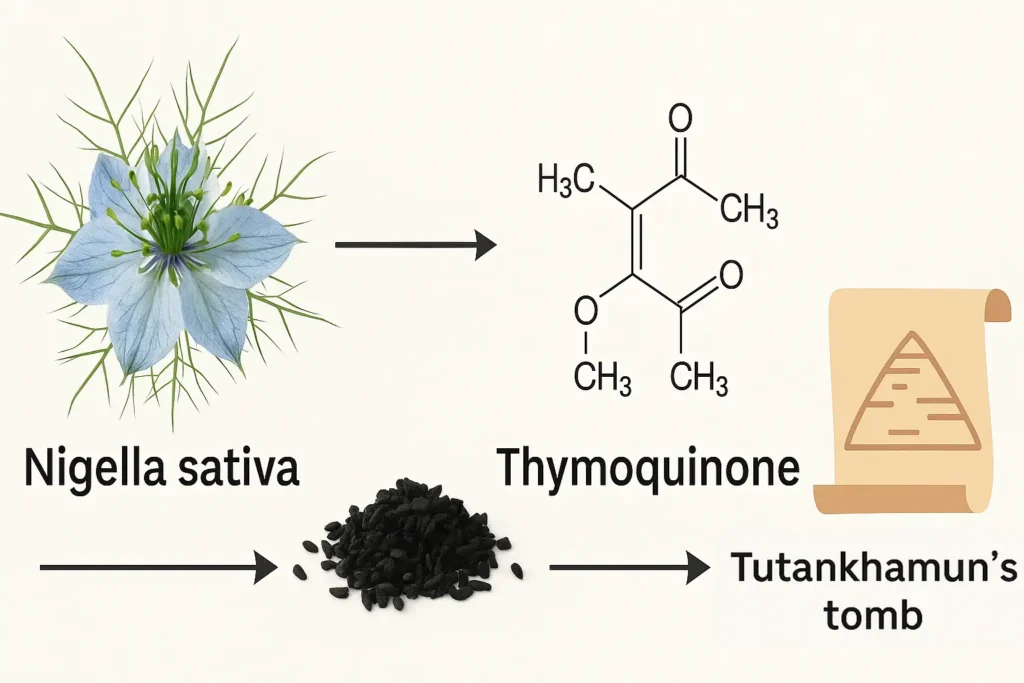Introduction to Black Seed Oil
In the heart of nature’s treasure trove lies a remedy that has whispered through the sands of time—black seed oil. This oil, a gift from the tiny but mighty Nigella sativa seeds, carries a legacy as rich and deep as the soil it springs from.
What is Black Seed Oil? Black seed oil is the essence, the very soul, extracted from the black seeds of the Nigella sativa plant, a small flowering shrub that blooms with white and pale blue flowers. Its seeds, dark, crescent-shaped, have been pressed and processed to release a potent oil that has captured the hearts and minds of healers, herbalists, and health-seekers for over two millennia.
History and Origin The story of black seed oil is one of mystique and marvel. Found in the tomb of the legendary Pharaoh Tutankhamun, it has graced the annals of ancient Egyptian culture as a key to immortality. The Islamic prophet Muhammad is said to have proclaimed black seed oil as a ‘cure for every disease except death.’ This oil, with its pungent aroma and powerful compounds, has traveled through history, finding its place in the traditional medicine cabinets of Asia, the Middle East, and Africa.
Its name, though varied across different cultures—black cumin, kalonji, or black caraway—echoes a common sentiment: this is nature’s panacea. Today, as more individuals turn to holistic health, black seed oil emerges as a focal point for those seeking natural alternatives, embodying the strength and resilience of the very plants it originates from.
Black Seed Oil and Its Compounds
Embark on a journey into the essence of wellness with black seed oil, a potion steeped in mystery and bursting with healthful promise. It’s not just an oil; it’s a symphony of compounds playing in harmony to heal and invigorate.

Thymoquinone and its Effects At the heart of black seed oil’s impressive health repertoire is thymoquinone, a compound that stands as a sentinel for your health. Thymoquinone is the maestro of the oil, conducting an orchestra of biological activities within your body. It’s a potent antioxidant, a fierce anti-inflammatory, and a vigilant protector against a myriad of ailments. It weaves through the pathways of your cells, offering protection, stability, and a breath of relief to inflamed tissues. The effect of thymoquinone is not just chemical—it’s almost alchemical, transmuting distress into comfort within the human body.
Nutritional Profile The nutritional profile of black seed oil is a tapestry of essential fatty acids, vitamins, and minerals. It’s rich in unsaturated and polyunsaturated fats, the very elements that your body needs for heart health and brain function. Linoleic acid and oleic acid gleam within this profile, contributing to its cholesterol-lowering fame. Black seed oil is also a modest treasure trove of B vitamins, vital for energy and the nervous system, and trace elements like selenium, which whispers of anti-aging secrets to your cells.
Table: The Nutritional Symphony of Black Seed Oil
| Nutrient | Benefit |
|---|---|
| Thymoquinone | Acts as a powerful antioxidant and anti-inflammatory agent, mitigating the effects of various ailments and promoting overall health. |
| Omega-6 Fatty Acids (Linoleic Acid) | Supports skin and hair health, and is essential for brain function, bone health, and regulating metabolism. |
| Omega-9 Fatty Acids (Oleic Acid) | Helps to lower bad cholesterol levels, improve mood, and bolster the immune system. |
| B Vitamins | Vital for converting food into energy, improving mood, and maintaining healthy brain function and nerve health. |
| Selenium | A trace mineral that plays a critical role in metabolism and has antioxidant properties that protect cells from damage. |
| Calcium | Essential for bone health and plays a crucial role in muscle function, nerve signaling, and heart health. |
| Iron | Crucial for making hemoglobin, a protein in red blood cells that carries oxygen from the lungs to all parts of the body. |
| Zinc | Fundamental for immune function, wound healing, blood clotting, thyroid function, and much more. |
The story of black seed oil is not just told in its history but also in its chemistry. Each drop is a bead of life, encapsulating the robust legacy of the Nigella sativa plant.
Asthma and Respiratory System
The whisper of breath that flows through the lungs carries with it the story of life and for those grappling with asthma, this story is often one of yearning for a breath unburdened. Asthma—a chronic condition where the airways narrow, swell, and produce extra mucus—can make breathing a laborious task, turning the simple act of inhaling into a formidable challenge.
Understanding Asthma Asthma manifests in wheezes, shortness of breath, chest tightness, and coughing that often worsen at night or early in the morning. It’s a tale of an overzealous immune response where the body’s defenses, meant to protect, ironically turn the respiratory system into a battleground. Triggers vary widely, from allergens and pollution to stress and exercise, making it a condition as unique as the individuals it affects.
Role of Black Seed Oil in Respiratory Health Enter black seed oil, a potential knight in shining armor for those besieged by the trials of asthma. The oil, redolent with the promise of Nigella sativa, may play a role in soothing the tumultuous seas of respiratory distress. Its potent anti-inflammatory properties help ease the inflammation in the airways, potentially reducing the severity of asthma attacks. Thymoquinone, the heart of black seed oil’s beneficial effects, may act as a bronchodilator, helping to expand the airways and facilitate easier breathing.
Embracing black seed oil could be akin to unlocking a natural remedy, one that has whispered through the ages as a breath of healing for the respiratory system. While not a panacea, it offers a ray of hope—a natural adjunct to traditional treatments that could lead to better breathing days.

Immune System Enhancement
In the vibrant tapestry of health, the immune system emerges as the guardian of our well-being, a complex network tirelessly guarding against unseen invaders. At the heart of this system’s arsenal lies the potential ally of black seed oil, a natural fortifier of our bodily defenses.
Black Seed Oil’s Immune-Boosting Properties Black seed oil, with its rich tapestry of nutrients and compounds, stands as a bastion of support for the immune system. Its key component, thymoquinone, acts like a vigilant sentinel, modulating the immune response and enhancing the body’s ability to fend off pathogens. The oil’s unique ability to balance immune reactions ensures that it is neither overzealous nor lethargic in its response to threats.
The embrace of black seed oil as part of a daily wellness routine is more than just a nod to tradition; it’s a statement of trust in the wisdom of nature’s own medicine cabinet. By fostering a robust immune response, black seed oil helps weave a shield of resilience within the body, empowering it to withstand the ebbs and flows of health challenges.
Digestive Health
Amidst the hustle of life, the harmony of digestive health is crucial for a joyful existence. The gut, often termed the ‘second brain,’ is pivotal to overall well-being, and black seed oil emerges as a gentle yet potent ally in nurturing this delicate ecosystem.
Black Seed Oil and Gut Health With its treasure trove of anti-inflammatory and antibacterial properties, black seed oil acts as a soothing balm to the lining of the gut. It aids in the graceful dance of digestion, ensuring that the process is smooth and without distress. The oil has been found to assist in calming the spasms that lead to cramps and discomfort, a silent whisper of relief to a restless digestive tract.
Moreover, black seed oil contributes to a more robust gut flora, fostering a community of beneficial bacteria that are essential for optimal health. It’s like planting a garden within, where each microbe blooms, contributing to a landscape of digestive harmony.
The focus keyword “black seed oil” resonates with promise, suggesting a natural path to a tranquil and healthy digestive system, free from the chains of bloating, indigestion, and inflammation.
Skin and Hair Benefits
The quest for a radiant complexion and lustrous hair is as old as time itself. In the pursuit of such ageless beauty, black seed oil emerges as a natural elixir, revered for its ability to bestow a healthy glow and vitality upon those who embrace its use.
Using Black Seed Oil for Dermatological Health Black seed oil, when whispered into the narrative of skin and hair care, speaks volumes of its dermatological prowess. This ancient remedy, rich in essential fatty acids, vitamins, and minerals, nourishes the skin deeply, imbuing it with a clarity and resilience that mirrors the vitality of life itself. For the skin, it is known to combat the blemishes of acne, soothe the irritation of eczema, and fade the whispers of scars and dark spots, restoring the skin’s natural harmony.
As for the crowning glory that is one’s hair, black seed oil offers its strength and shine. It addresses the silent cries of follicles yearning for nourishment, potentially curbing the fall of precious strands and encouraging the growth of hair that weaves the silk of health through every fiber.
By integrating the focus keyword “black seed oil,” we highlight its role not only as a remedy but as a guardian of dermatological health, offering a shield against the ravages of environmental stressors and the passage of time.
Heart Health
In the symphony of the body, the heart conducts the rhythm of life. Protecting this vital organ is central to our well-being, and black seed oil plays a poignant tune in this mission of heart health.
Impact on Blood Pressure and Cholesterol Black seed oil, with its potent blend of natural compounds, has been shown to be a friend to the heart. Its gentle but effective touch may help in reducing high blood pressure, allowing the blood to flow more freely, reducing the strain on the heart’s delicate tissues. This, in turn, composes a melody of relief and ease for the cardiovascular system.
Furthermore, the focus keyword “black seed oil” resonates with potential in the realm of cholesterol management. It is thought to help balance cholesterol levels, reducing LDL (the ‘bad’ cholesterol) and increasing HDL (the ‘good’ cholesterol). This balance is crucial; it’s the harmony needed for the prevention of plaque buildup in the arteries, guarding against the silent threat of heart disease.
By incorporating black seed oil into one’s diet, we may be able to support a strong and healthy heart, ensuring that life’s rhythm beats strong and true.
Weight Loss and Metabolism
In the journey towards health and wellness, weight management often takes center stage. Here, black seed oil steps into the spotlight as a potential ally, offering a nudge to the metabolism in the dance of weight loss.
Black Seed Oil as a Metabolic Booster The focus keyword “black seed oil” carries with it a promise of metabolic rejuvenation. This ancient elixir is thought to stimulate the metabolism, the body’s engine that burns calories and fuels our daily activities. By enhancing the metabolic rate, black seed oil may help the body use energy more efficiently, turning the tide in the battle against excess weight.
Moreover, its potential appetite-suppressing properties whisper of a natural way to help curb cravings, gently guiding one towards healthier eating habits. By integrating black seed oil into a balanced diet and lifestyle, it may serve as a beacon, leading the way towards a healthier weight and a more vibrant life.
Cancer-Fighting Potential
In the realm of health, the word ‘cancer’ often casts a shadow, evoking a battle for wellness. Amidst this struggle, black seed oil emerges as a beacon of hope, its potential in cancer research unfolding like the petals of a promising flower.
Research on Black Seed Oil and Cancer The focus keyword “black seed oil” whispers of potential in the ongoing fight against cancer. Research has started to illuminate the role this ancient remedy may play in this modern battle. Studies suggest that compounds in black seed oil, particularly thymoquinone, may possess anti-cancer properties. This compound appears to help in regulating cell death, known as apoptosis, in cancer cells, thereby potentially inhibiting the growth and spread of these cells.
While the journey of research is ongoing, the early findings offer a glimmer of hope. They suggest that black seed oil might one day play a supportive role in comprehensive cancer care, offering a natural complement to traditional treatments.
It’s important to remember that while black seed oil shows promise, it is not a cure for cancer. However, its potential as a supportive natural therapy is an area of exploration that could bring a new dimension to cancer treatment strategies.
Analgesic and Anti-Inflammatory Effects
Pain, a universal human experience, often stands as a barrier to a life lived fully. In the search for relief, many turn to nature, and here, black seed oil offers a glimmer of solace.
Black Seed Oil for Pain Relief The focus keyword “black seed oil” is not just a term; it’s a symbol of natural healing. This oil, steeped in history and tradition, is renowned for its analgesic and anti-inflammatory properties. The compounds in black seed oil, particularly thymoquinone, work like a soothing melody, alleviating pain and reducing inflammation at its source. Whether it’s the chronic ache of arthritis or the sharp sting of a muscle strain, black seed oil provides a gentle, yet potent relief.
Its anti-inflammatory effects are particularly significant. By reducing inflammation, black seed oil doesn’t just mask pain; it goes to the root of the problem, addressing the underlying cause and offering a more holistic approach to pain management.
Incorporating black seed oil into one’s wellness routine could thus be a step towards reclaiming the joy and comfort of a life less burdened by pain.
Antioxidant Properties
In the eternal dance of health and vitality, antioxidants play a pivotal role, guarding our cells against the invisible onslaught of free radicals. Within this dance, black seed oil emerges as a powerful partner, its antioxidant properties providing a shield of protection.
Fighting Free Radicals with Black Seed Oil The focus keyword “black seed oil” resonates with a promise of cellular defense. This ancient remedy, embraced for centuries, is laden with antioxidants—nature’s own warriors against free radical damage. These antioxidants in black seed oil, including the celebrated thymoquinone, wage a silent war against oxidative stress, a key contributor to aging and various chronic diseases.
Free radicals, the rogue elements that antioxidants combat, are produced both through natural bodily processes and external factors like pollution and UV exposure. The antioxidants in black seed oil help neutralize these free radicals, thus preventing them from causing cellular damage.
Incorporating black seed oil into your daily regimen is akin to fortifying your body’s defenses, ensuring that each cell is armored against the relentless tide of oxidative stress. It’s a gesture of care, a commitment to safeguarding your body’s health at the most fundamental level.
Black Seed Oil for Diabetes Management
In the tapestry of modern health challenges, diabetes stands out as a pervasive concern, affecting millions worldwide. In this landscape, black seed oil emerges as a potential ally, offering a glimmer of hope in the management of this condition.
Blood Sugar Regulation The focus keyword “black seed oil” carries with it a promise of balance, particularly in the realm of blood sugar regulation. This natural oil, extracted from the seeds of the Nigella sativa plant, has been studied for its potential impact on blood glucose levels. The compounds in black seed oil, including the acclaimed thymoquinone, are believed to aid in enhancing the body’s sensitivity to insulin, the hormone responsible for regulating blood sugar.
For those navigating the complexities of diabetes, black seed oil might offer a complementary approach to traditional treatments. Its use could be a gentle nudge towards stabilizing blood sugar levels, an important aspect in managing diabetes and preventing its complications.
While black seed oil is not a standalone cure for diabetes, its inclusion in a health regimen, alongside a balanced diet and regular exercise, could be a stride towards better health and a more controlled glycemic state.
Mental Health and Neurological Impact
The quest for mental clarity and neurological wellness is as vital as the pursuit of physical health. In this journey, black seed oil emerges as a potential beacon of hope, illuminating the path to cognitive well-being.
Cognitive Benefits of Black Seed Oil The focus keyword “black seed oil” here is not just a term; it’s a symbol of mental rejuvenation. This ancient oil, revered for centuries, is now being explored for its potential impact on cognitive health. Rich in antioxidants and anti-inflammatory compounds, black seed oil is believed to nurture the brain, providing a protective barrier against neurological deterioration.
Studies suggest that black seed oil may aid in enhancing memory, improving attention, and fostering overall cognitive function. This is particularly significant in the context of aging and neurodegenerative diseases, where cognitive decline is a major concern. By potentially mitigating inflammation and oxidative stress in the brain, black seed oil could play a role in maintaining cognitive health and resilience.
Incorporating black seed oil into one’s wellness routine might, therefore, be viewed as an act of care for the brain, a step towards preserving its vitality and function.

Usage and Dosage
Embarking on the journey of incorporating natural remedies into one’s health regimen demands a blend of enthusiasm and caution. This is particularly true for black seed oil, a potent botanical with a myriad of benefits.
How to Use Black Seed Oil Safely The focus keyword “black seed oil” not only evokes its therapeutic potential but also the importance of its responsible usage. When it comes to incorporating black seed oil into your routine, the key is moderation and understanding.
As a dietary supplement, black seed oil can be consumed directly, typically in small doses – a few drops to a teaspoon (about 5ml) – once or twice daily. It can also be incorporated into meals; drizzled over salads, blended into smoothies, or added to other dishes for flavor and health benefits.
Topically, black seed oil can be applied directly to the skin or mixed with a carrier oil for those with sensitive skin. For hair, it can be massaged into the scalp or added to shampoos or conditioners.
However, it’s crucial to start with a lower dose and observe how your body reacts, gradually increasing as needed. As with any supplement, it’s important to consult with a healthcare provider, especially if you have underlying health conditions or are taking other medications.
Potential Side Effects and Interactions
While black seed oil is celebrated for its myriad health benefits, it’s crucial to approach its use with informed caution. Understanding the potential side effects and interactions is key to safely integrating this natural remedy into your health regimen.
Precautions and Contraindications The focus keyword “black seed oil” conveys not just its benefits but also the importance of being aware of its potential drawbacks. Generally, black seed oil is well-tolerated by most individuals when used in moderation. However, like any supplement, it can have side effects, particularly if taken in large doses or without proper guidance.
Some possible side effects include digestive upset, such as bloating and stomach pain, allergic reactions, particularly in individuals sensitive to the Nigella sativa plant, and lowered blood pressure or blood sugar levels, which could be a concern for those on medications for hypertension or diabetes.
Pregnant and breastfeeding women are advised to avoid black seed oil due to limited research on its safety in these populations. Additionally, those with bleeding disorders or who are on medication to prevent blood clots should exercise caution, as black seed oil may have blood-thinning properties.
It’s crucial to consult with a healthcare professional before starting any new supplement, particularly if you have existing health conditions or are taking other medications, to avoid adverse interactions.
Conclusion
As we draw the curtains on our exploration of black seed oil, we are left with a sense of awe at the tapestry of benefits woven by this ancient, natural remedy. From bolstering our immune system to nurturing our skin and hair, from guarding our heart to soothing our aches, black seed oil has revealed itself to be a versatile and potent ally in our quest for health and wellness.
However, this journey also reminds us of the delicate balance necessary in embracing natural remedies. While black seed oil offers a beacon of hope across various health fronts, it demands respect and caution in its use. Understanding its potential side effects and interactions is as vital as appreciating its benefits.
In the end, black seed oil stands not just as a remedy, but as a symbol of the harmony between nature and health. It encourages us to look back at the wisdom of ancient practices while moving forward with the knowledge and caution of modern science.
As you consider integrating black seed oil into your life, do so with mindfulness and respect for its power. Consult with healthcare professionals, listen to your body, and let black seed oil be a natural complement to a life lived with health, vitality, and joy.
Resources
- WebMD on Black Seed Oil – A comprehensive resource for understanding the health benefits, side effects, and uses of black seed oil. Visit WebMD
- Healthline’s Guide to Black Seed Oil – This guide offers detailed information about the potential health benefits and risks associated with black seed oil. Explore Healthline
- PubMed Central – For those interested in scientific studies and research papers on black seed oil. Access PubMed Central
- National Center for Complementary and Integrative Health (NCCIH) – Provides research-based information on black seed oil and other natural remedies. Visit NCCIH


16 thoughts on “Black Seed Oil as Your Ultimate Remedy for Respiratory Harmony”